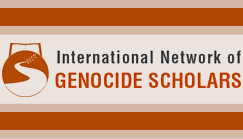Loading...
Submission Type
Paper
Abstract
During the Khmer Rouge dictatorship, especially after 1978, the death rate in Cambodia was so terrible that the regime decided on a policy of forced population increase. Up to 500,000 young women, often aged 14 or 15, were forced into marriages with Khmer Rouge cadres. Under threat of death, the young brides were forced to consummate their marriages on their wedding nights with men they had never met before. The circumstances of these forced marriages have been suppressed for four decades. The New post-Khmer Rouge Cambodian Cinema is dedicated to telling this taboo-ized historical truth. Analyzing prominent examples (e.g., Lida Chan and Guillaume P. Suon's Red Wedding [2013] and Neang Kavich's Three Wheels [2015]), this paper deals for the first time with the Cambodian genocide as a gendered genocide. It questions how we should analyze the layers of gendered silencing surrounding both women's traumatic history and women collaborators and perpetrators of these sexual crimes. The new wave's corporeal traumatic memory depicts the transformation of women victims into civil parties at the Extraordinary Chambers in the Courts of Cambodia for the Prosecution of Crimes Committed during the Period of Democratic Kampuchea; and raises highly controversial issues, such as the influence of former Khmer Rouge within current Cambodian society, and the necropolitical function of the killing fields as “truth spaces.” The cinematic breakings of collective repression of the trauma of genocidal forced marriage and rape has a special resonance on the vital question of cinema and culture's role in healing post-traumatic society.

New Cambodian Cinema, Gendercide, Genocidal Forced Marriage and Rape
During the Khmer Rouge dictatorship, especially after 1978, the death rate in Cambodia was so terrible that the regime decided on a policy of forced population increase. Up to 500,000 young women, often aged 14 or 15, were forced into marriages with Khmer Rouge cadres. Under threat of death, the young brides were forced to consummate their marriages on their wedding nights with men they had never met before. The circumstances of these forced marriages have been suppressed for four decades. The New post-Khmer Rouge Cambodian Cinema is dedicated to telling this taboo-ized historical truth. Analyzing prominent examples (e.g., Lida Chan and Guillaume P. Suon's Red Wedding [2013] and Neang Kavich's Three Wheels [2015]), this paper deals for the first time with the Cambodian genocide as a gendered genocide. It questions how we should analyze the layers of gendered silencing surrounding both women's traumatic history and women collaborators and perpetrators of these sexual crimes. The new wave's corporeal traumatic memory depicts the transformation of women victims into civil parties at the Extraordinary Chambers in the Courts of Cambodia for the Prosecution of Crimes Committed during the Period of Democratic Kampuchea; and raises highly controversial issues, such as the influence of former Khmer Rouge within current Cambodian society, and the necropolitical function of the killing fields as “truth spaces.” The cinematic breakings of collective repression of the trauma of genocidal forced marriage and rape has a special resonance on the vital question of cinema and culture's role in healing post-traumatic society.





Comments
View the agenda item.
View Raya Morag's bio.